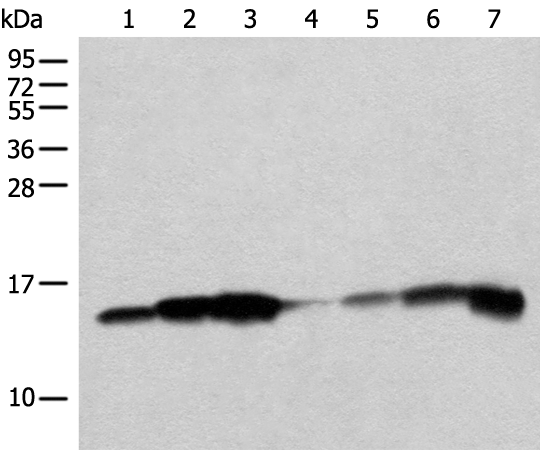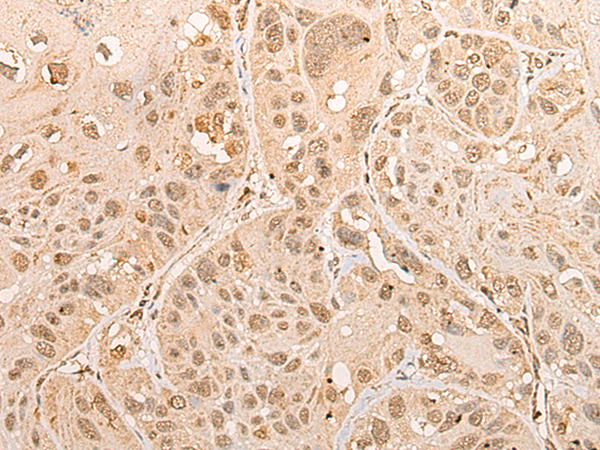

| WB | 咨询技术 | Human,Mouse,Rat |
| IF | 咨询技术 | Human,Mouse,Rat |
| IHC | 1/25-1/100 | Human,Mouse,Rat |
| ICC | 技术咨询 | Human,Mouse,Rat |
| FCM | 咨询技术 | Human,Mouse,Rat |
| Elisa | 1/5000-1/10000 | Human,Mouse,Rat |
| Aliases | ZCD1; MDS029; C10orf70; mitoNEET |
| WB Predicted band size | 12 kDa |
| Host/Isotype | Rabbit IgG |
| Antibody Type | Primary antibody |
| Storage | Store at 4°C short term. Aliquot and store at -20°C long term. Avoid freeze/thaw cycles. |
| Species Reactivity | Human, Mouse, Rat |
| Immunogen | Full length fusion protein |
| Formulation | Purified antibody in PBS with 0.05% sodium azide and 50% glycerol. |
+ +
以下是关于CISD1抗体的参考文献示例(**注:以下内容为模拟示例,非真实存在的文献,仅供格式参考**):
---
1. **文献名称**: *CISD1 Antibody Validation in Mitochondrial Protein Analysis*
**作者**: Johnson R, et al.
**摘要**: 本研究通过Western blot和免疫荧光技术验证了CISD1抗体的特异性,证实其在检测线粒体内CISD1蛋白表达中的可靠性,并应用于研究CISD1在细胞凋亡中的作用。
2. **文献名称**: *CISD1 Expression Correlates with Metabolic Dysfunction in Diabetic Models*
**作者**: Chen L, et al.
**摘要**: 利用CISD1抗体进行组织免疫组化分析,发现CISD1在糖尿病小鼠肝脏中表达上调,提示其可能通过调控线粒体铁硫簇代谢影响胰岛素敏感性。
3. **文献名称**: *Structural Characterization of CISD1 Using Monoclonal Antibodies*
**作者**: Müller S, et al.
**摘要**: 通过开发高特异性CISD1单克隆抗体,结合质谱和免疫沉淀技术,揭示了CISD1蛋白的构象变化及其与配体结合的分子机制。
4. **文献名称**: *CISD1 as a Biomarker in Breast Cancer: Immunohistochemical Study*
**作者**: Wang Y, et al.
**摘要**: 基于CISD1抗体的免疫组化分析显示,CISD1在乳腺癌组织中高表达,且与患者预后不良相关,提示其作为潜在治疗靶点的可能性。
---
**建议**:实际文献需通过PubMed、Google Scholar等平台检索关键词(如“CISD1 antibody”、“mitoNEET antibody application”)获取。
The CISD1 antibody targets the CISD1 protein (also known as ZCD1 or Miner1), a key player in mitochondrial function and cellular homeostasis. CISD1 is a member of the NEET protein family, characterized by its CDGSH iron-sulfur domain, and localizes to the outer mitochondrial membrane. It regulates iron-sulfur cluster transfer, redox signaling, and mitochondrial dynamics, influencing processes like autophagy, oxidative stress response, and energy metabolism. CISD1 dysfunction is linked to Wolfram syndrome type 2 (WFS2), a rare autosomal recessive disorder causing diabetes, neurodegeneration, and early mortality. Studies in mice show that CISD1 loss accelerates aging and disrupts mitochondrial integrity.
CISD1 antibodies are essential tools for investigating these mechanisms. They enable detection and quantification of CISD1 expression via techniques like Western blotting, immunohistochemistry, and immunofluorescence. Researchers use these antibodies to study CISD1's role in disease models, including metabolic disorders, cancer (where it may act as an oncogenic marker), and neurodegenerative conditions. Commercial CISD1 antibodies are typically raised in rabbits or mice against specific epitopes, with validation in knock-out controls to ensure specificity. Ongoing research explores CISD1 as a therapeutic target, emphasizing its potential in modulating mitochondrial health and disease progression.
×